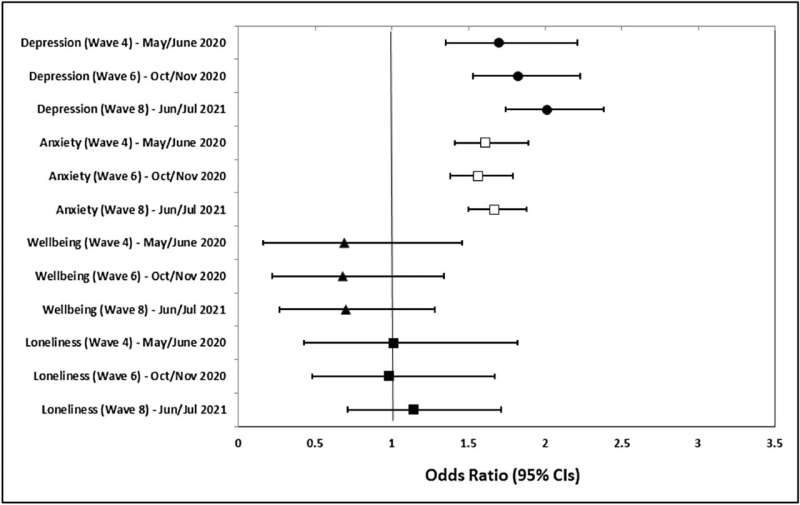First-wave COVID-19 linked to long-term depressive symptoms

Those who reported having COVID in early 2020 were also 1.67 times more likely to display clinically meaningful levels of anxiety after 13 months, than those who avoided COVID-19 in the same time period.
Led by Professor Daryl O'Connor and Dr. Sarah Wilding of the School of Psychology at the University of Leeds, the researchers surveyed more than 3,000 UK adults, representing a cross-section of the general population.
The study relied on participants self-reporting COVID-19, as limited testing was available at the beginning of the pandemic. However, the levels of reported infection are similar to two other key UK studies conducted at a similar time.
They also found that having a mental health condition before the pandemic was associated with increased odds of contracting COVID-19. Possible reasons for this may include lifestyle factors such as smoking, physical health vulnerabilities linked to poor mental health, and lower levels of adherence to government COVID-19 restrictions.
Previous UK studies have reported increases in anxiety and depression symptoms after patients likely contracted COVID-19, but only around six months later. This study suggests that the virus may have longer-lasting mental health impact than previously thought.
The researchers are calling for medical professionals to take their findings into account when treating patients who have had COVID-19. Professor O'Connor said: "The findings highlight the importance for GPs and other healthcare professionals to be vigilant to these longer-lasting symptoms and to put in place treatments and support for mental health, as well as physical health, for patients who may have contracted COVID-19 infection."
The researchers highlighted that long COVID may also be a factor in the findings, as its long-term symptoms such as fatigue, sleep disturbance, headaches, brain fog, loss of taste and smell and breathlessness could contribute to anxiety, depression and poor well-being.
They concluded that further investigation was needed to identify the causes of the long-term impacts of COVID-19 on mental health.
A spokesperson for the Mindstep Foundation, one of the funders, said: "The Mindstep Foundation are pleased to fund this research, which is an important first step towards an evidence base on the ongoing effects of the COVID-19 pandemic on mental health. Our hope is that this will inform better treatment and support for those affected moving forward."
The work is published in the journal Scientific Reports.
More information: Sarah Wilding et al, Probable COVID-19 infection is associated with subsequent poorer mental health and greater loneliness in the UK COVID-19 Mental Health and Wellbeing study, Scientific Reports (2022). DOI: 10.1038/s41598-022-24240-3




















